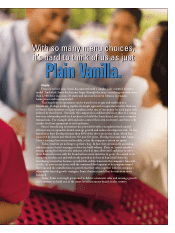Sonic 2002 Annual Report Download - page 17
Download and view the complete annual report
Please find page 17 of the 2002 Sonic annual report below. You can navigate through the pages in the report by either clicking on the pages listed below, or by using the keyword search tool below to find specific information within the annual report.
Sonic 02 15
Management’s Discussion and Analysis
Comparison of Fiscal Year 2002 to Fiscal Year 2001. Total revenues increased 21.0% to $400.2 million during fiscal
year 2002 from $330.6 million in fiscal year 2001. Company-owned restaurant sales increased 23.6% to $330.7 million
during fiscal year 2002 from $267.5 million in fiscal year 2001. Of the $63.2 million increase, $58.9 million was due to
the net addition of 140 company-owned restaurants since the beginning of fiscal year 2001 ($61.4 million from the
addition of 74 newly constructed restaurants and 75 acquired restaurants since the beginning of fiscal year 2001 less $2.5
million from nine stores sold or closed during the same period). Average sales increases of approximately 1.7% by stores
open the full reporting periods of fiscal year 2002 and 2001 accounted for $4.3 million of the increase.
Franchise royalties increased 13.2% to $61.4 million during fiscal year 2002, compared to $54.2 million in fiscal year
2001. Of the $7.2 million increase, approximately $3.9 million was attributable to franchise same-store sales growth of
3.2% combined with an increase in the effective royalty rate from 3.18% in fiscal year 2001 to 3.27% in fiscal year 2002.
Each of the company’s license agreements contains an ascending royalty rate feature whereby the royalty rate increases as
sales volumes increase. The balance of the increase resulted from an increase in the number of franchise restaurants
operating in fiscal year 2002 compared to fiscal year 2001. Franchise fees decreased 8.8% as 142 franchise drive-ins
opened during fiscal year 2002 as compared to 157 in fiscal year 2001. However, the average franchise fee increased as a
greater percentage of stores opened under the newest form of license agreement, which has a higher franchise fee and
royalty rate.
The company expects total revenue growth during fiscal year 2003 of approximately 15% based on targeted same-
store sales growth of 1% to 3% as well as the addition of approximately 190 to 200 new drive-ins (35 to 40 company-
owned and 150 to 160 franchise). The company anticipates that the continued benefit of the ascending royalty rate and
new franchise store openings will result in $7.0 million to $8.0 million in incremental franchise royalties and an increase
of approximately seven to ten basis points in the average royalty rate.
Restaurant cost of operations, as a percentage of company-owned restaurant sales, was 73.2% during fiscal year 2002
compared to 73.0% in fiscal year 2001. Food and packaging costs, as a percentage of company-owned restaurant sales,
remained flat as lower than expected beef costs and a moderation in dairy costs were offset by slightly increased
discounting from standard menu prices. Payroll and employee benefits, as a percentage of company-owned restaurant
sales, increased 40 basis points as a result of an increase in average wage rates, increased investment in store-level labor as
a part of the company’s commitment to outstanding customer service, and an increase in training and store-level
management for the rollout of the breakfast program. Other operating expenses, as a percentage of company-owned
restaurant sales, decreased 13 basis points primarily as a result of the leverage of higher sales volumes and improvements
in utility costs. Minority interest in earnings of restaurants decreased, as a percentage of company-owned restaurant
sales, to 4.5% during fiscal year 2002, compared to 4.7% in fiscal year 2001 as a result of the decline in overall restaurant-
level margins. Most of the managers and supervisors of company-owned restaurants own a minority interest in the
restaurants, and a substantial portion of their compensation flows through the minority interest in earnings of restaurants.
Looking forward, the company expects restaurant cost of operations to remain flat or increase slightly, as a
percentage of company-owned restaurant sales, during fiscal year 2003 as the leverage of operating at higher volumes and
a favorable food cost environment is anticipated to mostly offset the continued investment in store-level labor and rising
workers’ compensation insurance rates. The company continues to look for ways to strengthen its partnership program
so that a larger percentage of managers’ and supervisors’ compensation is derived from the partnership program.
However, since the company expects store-level margins to remain flat or deteriorate slightly, minority interest in
earnings of restaurants is expected to remain flat or decline slightly as a percentage of company-owned restaurant sales.
Selling, general and administrative expenses decreased, as a percentage of total revenues, to 8.4% during fiscal year
2002, compared with 9.3% in fiscal year 2001 as a result of the leverage of operating at higher sales volumes. The
company expects selling, general and administrative expenses to grow by 8% to 10% in fiscal year 2003 while continuing
to decline as a percentage of total revenues. A significant portion of the company’s future revenue growth will be
attributable to company-owned restaurants. Company-owned restaurants require a lower level of selling, general and
administrative expenses, as a percentage of revenues, than the company’s franchising operations since most expenses of
company-owned restaurant operations are reflected in restaurant cost of operations and minority interest in restaurant
operations.
























